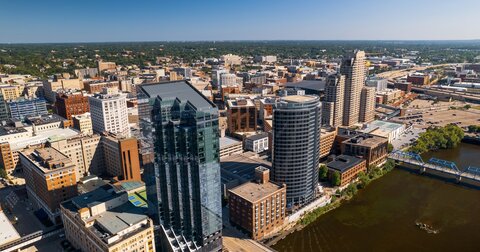Feedback mostly opposes Grand Rapids climate plan
Plan aims to reduce greenhouse gas emissions from city operations by 85% by 2030
Most of the feedback given to the Grand Rapids climate action plan opposes it, according to public comment received through a records request.
The Wege Foundation pitched the plan for Michigan’s second-largest city, which houses about 200,000 people. More than half of public comments opposed one or more parts of the six-chapter plan.
Of the 42 public comments submitted to the city of Grand Rapids, 22 responses opposed parts of the draft plan while 18 supported it and two gave mixed feedback.
The plan spanned six chapters: Energy (more solar use), Healthy Homes (less electric use; income-based electric rates), Commercial buildings (less energy use), Transportation (more carpooling and cycling, denser developments), Natural Systems (more trees and rain gardens), and Food systems (more urban agriculture and composting, less food in trash). A majority of the feedback focused on commercial buildings.
The plan aims to reduce energy consumption by requiring building owners to report their energy use, creating building performance standards, and using tune-ups, audits, or retro-commissioning.
One respondent wrote: “It appears to be a feel-good, virtue-signaling, exercise undertaken by highly uninformed people without any appreciation for physics, economics, or common sense. That such a group has the chance of gaining effectively [sic] taxing authority through the City of Grand Rapids, en route to assessing fees to tax-paying, service-providing, business owners simply because we exist and house every business that makes the City of Grand Rapids function economically and socially is shocking.”
Other feedback welcomed the plan and said it didn’t go far enough.
“We are in a climate emergency and the department of sustainability are [sic] the City’s emergency response team,” the person wrote. “It’s time to be more aggressive and advocate for change like our life depends on it (because in this case, unfortunately, it does).”
The Wege Foundation has spent nearly $2 million over five years trying to get the city of Grand Rapids to reduce greenhouse gas emissions and encourage electrification, according to documents obtained through a record request.
The money partially funded the salaries of climate change workers and pilot projects. The funding paid the salary of a healthy and sustainable buildings policy specialist and the nonprofit Community Collaboration on Climate Change, among other things, according to 10 documents obtained through a records request.
The city of Grand Rapids will release a full draft of its climate action and adaptation plan in December. Enactment will depend on the decision of city commissioners.
The funding sought three outcomes. First, to reduce greenhouse gas emissions from city operations by 85% by 2030 compared to 2008 and to achieve carbon neutrality by 2040.
The draft aims to achieve and maintain 100% renewable energy for 2025, 2030, and 2040 modeling.
Finally, the draft aims to transition the city vehicle fleet to a low or no-emission fleet.
The city of Grand Rapids has 798 vehicles and equipment, according to Steve Guitar, city of Grand Rapids media relations manager.
The Grand Rapids 2030 District is a program of the US Green Building Council of West Michigan launched in 2015 in partnership with the City of Grand Rapids funded by the Wege Foundation.
The GR2030 is one of three districts in Michigan, along with Ann Arbor and Detroit, and one of 22 across North America. The GR2030’s work decarbonizes buildings and transportation, as aligned with the goals of the Paris Climate Accord.
Michigan Capitol Confidential is the news source produced by the Mackinac Center for Public Policy. Michigan Capitol Confidential reports with a free-market news perspective.


 State climate conference to tout clean energy plans that will raise electricity costs
State climate conference to tout clean energy plans that will raise electricity costs
 Grand Rapids seeks feedback on climate action plan
Grand Rapids seeks feedback on climate action plan
 Drive less, use less energy, switch to electric vehicles, says Grand Rapids climate action plan
Drive less, use less energy, switch to electric vehicles, says Grand Rapids climate action plan